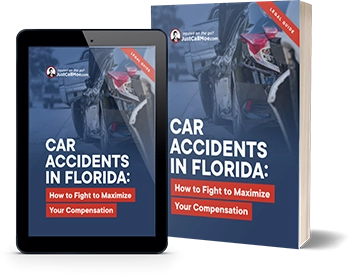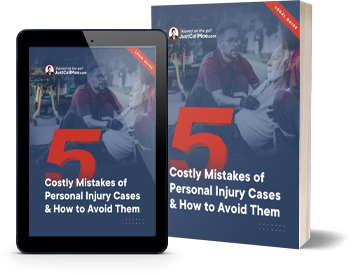Truck driver fatigue is a public safety hazard in Florida and around the nation. When truckers are tired, they make preventable mistakes behind the wheel of a big rig. Large trucks like 18 wheelers or garbage trucks can crash into lighter vehicles and leave occupants with life-changing injuries. Truck driver fatigue is truly a public health crisis.
People injured in accidents caused by truck driver fatigue have a legal right to seek financial compensation. At JustCallMoe, our Winter Haven truck accident lawyers will investigate a claim to determine if fatigue played a factor. If so, the trucker is probably at fault, and, by extension, the trucker’s employer shares liability as well. Then we can negotiate for favorable compensation for all your damages. Contact us today to schedule a free consultation.
How Big a Problem is Truck Driver Fatigue?
Trucker fatigue is a major issue in this industry—and has been for a long time. Truckers face intense pressure to get to their destination as soon as possible. Consequently, many speed or take other dangerous actions. Some drive all night until they nod off behind the wheel.
A tired driver is prone to errors:
- Impaired coordination
- Delayed or slowed reflexes
- Poor decision making
- Blurred vision
- Unconsciousness when falling asleep
Even nodding off for a split second is enough to cause a crash because a trucker cannot see a vehicle in front of it.
Accidents caused by truck driver fatigue are a significant problem. One study by the Federal Motor Carrier Safety Administration (FMCSA) found that fatigue was a critical event in many accidents. The large number of drowsy driving accidents led to government regulations to make the industry safer.
Federal Regulations
The Federal Motor Carrier Safety Administration has tried to minimize trucker fatigue by limiting the number of hours a trucker can work. These “hours of service” regulations apply whenever a trucker crosses state lines.
For example, if a trucker hauls goods, then the following apply:
- Cannot drive more than 11 hours after 10 consecutive hours off duty.
- Cannot drive past the 14th consecutive hour on duty after 10 consecutive hours off.
- Must have a mandatory 30-minute break after 8 hours on duty.
- Cannot drive after 60/70 hours on duty for 7/8 consecutive days. The clock restarts after 34 or more consecutive hours off duty.
The trucking industry has put pressure on the government to relax these rules—and the FMCSA has unfortunately agreed. We are not surprised that truck driver fatigue accidents are still a problem in Florida and other states.
How We Prove Truck Driver Fatigue
If you were hurt in a crash by a tired trucker, you can seek financial compensation from the driver or their employer. First, however, we need to prove negligence.
Driving while fatigued or going over the hours-of-service regulations is a type of negligence. We use different types of evidence:
- Your testimony. Did the trucker show signs of fatigue after the accident? We can use your observations to show that fatigue likely played a role in the crash.
- The trucker’s statements. Share any statements the trucker made after the accident with your Winter Haven truck accident lawyer. We can introduce those statements into evidence.
- Witness testimony. Third-party witnesses can also offer their perspectives about how the trucker acted.
- Electronic Logging Device (ELD) data. Most commercial trucks are now outfitted with ELDs. These devices continuously download critical information about a truck while it is in motion. We can use this data to prove how long the trucker was driving. Call an attorney quickly. You don’t want the trucking company to “accidentally” erase this data before you can access it. Our firm knows how to demand that the trucking company preserve any useful evidence.
- Dashcam or other video evidence. The crash might have been captured on video. For example, a trucker might have crashed near a gas station or a car dealership that has a camera pointed at the highway. Having the accident on tape helps prove what happened.
This is some of the most useful evidence for a truck accident case. Our lawyers will quickly investigate what happened to bolster your legal claim.
Compensation for a Truck Accident
We have helped many accident victims seek financial compensation after a wreck. Our firm can demand compensation for certain damages:
- Car repairs
- Medical bills
- Replacement of lost wages
- Pain and suffering
- Emotional distress
Because of their size, these trucks can cause devastating injuries to innocent people. Some of the most common injuries include fractures, chest injuries, crush injuries, and concussions. Some people are permanently disabled after a collision with a heavy truck, and we are determined to help them hold the trucker accountable.
We might even seek punitive damages if the trucking company had a policy of encouraging drivers to violate the hours-of-service regulations. Florida allows punitive damages in certain cases where the defendant acted in an egregious manner.
Why You Shouldn’t Negotiate Alone
You might think a fatigued driving accident is open and shut. Unfortunately, trucking companies and their insurance carriers like to fight these claims. They might even allege you are partly to blame for the collision because you were driving distracted or speeding. They will point to your negligence as a reason to pay you less in compensation—or to deny your claim entirely.
Work with our experienced truck accident lawyers. Florida has changed its comparative negligence rule so that it is now more friendly to defendants. You don’t want to slip up and say something that ends up undercutting your legal claim.
Reach Out to Our Law Office
At JustCallMoe, our attorneys fight for the rights of accident victims like you. No one should go up against a giant multi-state trucking company on their own. You need the steady guidance that only a seasoned law firm can provide. Contact us today to discuss your case in a free, no-risk consultation.

 (866) 225-5663
(866) 225-5663



